-
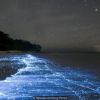 +22 +1
+22 +1The ocean is a strange place after dark
Moonlight triggers the world’s biggest orgy, strange creatures emerge from the depths, and waves glow blue. Some phenomena in the ocean can only be witnessed after dark.
-
 +12 +1
+12 +1Coast Guard ship fined $6K for exceeding speed limit meant to protect right whales
Transport Canada has fined the Canadian Coast Guard Ship Sir William Alexander $6,000 for going too fast in the Gulf of St. Lawrence. The ship allegedly violated the federal government's 10-knot speed limit that was put in place in August to prevent further deaths of the endangered North Atlantic right whales. As of Sept. 16, there have been 11 right whales confirmed dead in the Gulf.
-
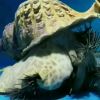 +12 +1
+12 +1Giant snails take on starfish in fight for the Great Barrier Reef
Snails aren't normally considered a predator, but researchers are hoping a world-first study will prove the Triton sea snail can eradicate one of the biggest threats to Queensland's Great Barrier Reef. According to News Corp, the Federal Government is funding the study which could one day see the giant snails released on the Reef.
-
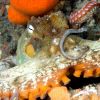 +12 +1
+12 +1Octlantis: the underwater city built by octopuses
f animals are our other, there is nothing quite so other as the octopus. It is the alien with whom we share our planet, a coeval evolutionary life form whose slithery slipperiness and more than the requisite number of limbs (each of which contains its own “brain”) symbolise the dark mystery and fear of the deep.
-
 +19 +1
+19 +1Fish have complex personalities, study suggests
Fish appear to be individuals with complex personalities, according to new research. Researchers tested the idea that Trinidadian guppies all had a fairly standard response to potential dangers. The theory went that they had a “simple spectrum” of reactions to danger – some things were more frightening than others but the fish basically all responded in the same way.
-
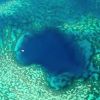 +1 +1
+1 +1How A Majestic Blue Hole In The Great Barrier Reef Was Discovered Using Google Maps
A simple tool like Google Maps led Queensland marine biologist Johnny Gaskell to discover what he has self-dubbed 'Gaskell's Blue Hole'. Previously unknown, the blue hole sits in the heart of the Great Barrier Reef off the Whitsunday Coast. Gaskell however, hasn't revealed the exact location of his discovery, so it remains a new and local secret.
-
 +21 +1
+21 +1Rivers polluting sea with plastic mostly from Asia
Up to 95 per cent of the plastic polluting the world's oceans comes from just 10 rivers, including the Ganges, new research has found. While eight of these 10 river systems are in Asia, two are in Africa. The findings published in the journal Environmental Science & Technology showed that large rivers play a particularly large role - not only because they also carry a comparatively large volume of waste on account of their larger discharge.
-
 +21 +1
+21 +1Sharks discovered inside active volcano, and footage proves they're alive
It's not a sharknado, but it just might be a sharkcano. Scientists recently found a sleeper shark living in an area that he wasn't supposed to be: in a volcano. The Kavachi is a very active underwater volcano in the Solomon Islands near Papua New Guinea, and when scientists sent down camera-laden robots to examine the volcano, they discovered far more than they expected.
-
 0 +1
0 +1Ocean acidification is deadly threat to marine life, finds eight-year study
Plastic pollution, overfishing, global warming and increased acidification from burning fossil fuels means oceans are increasingly hostile to marine life. If the outlook for marine life was already looking bleak – torrents of plastic that can suffocate and starve fish, overfishing, diverse forms of human pollution that create dead zones, the effects of global warming which is bleaching coral reefs and threatening coldwater species – another threat is quietly adding to the toxic soup.
-
 +16 +1
+16 +1The sea turtle that refused to be beaten by the storm
When Eleanor the sea turtle was caught in a tropical storm off the coast of Florida, she coped surprisingly well. In fact, she hardly needed to use any extra energy during the four days the storm raged - and neither was she injured. As the seas get warmer, the Earth suffers the ravages of ever more powerful storms and hurricanes, with massive consequences for both humans and animals. One of the concerns is marine animals, especially endangered species, such as certain whales, manatees, sharks, sea turtles, etc.
-
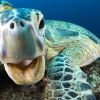 +17 +1
+17 +122 things you need to know about Blue Planet II
A year after the epic Planet Earth II, Sir David Attenborough is returning to our screens with a follow-up to 2004's Blue Planet. No spoilers, but we've seen the first episode and as sequels go we can confirm it's better than Sex And The City 2. We've also been to the press conference and spoken to some of the team behind the new series.
-
 +12 +1
+12 +1Sharks now protected no matter whose waters they swim in
It's been a good week for beleaguered sharks. A cross-border conservation pact signed by 126 countries this week promises for the first time to extend extra protection to sharks and several other migratory species, whichever countries they stray into.
-
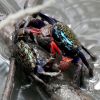 +2 +1
+2 +1Crab Gloats After Winning To Discourage Rematches
From touchdown dances to victory laps, we all love to bask in the glory after a big win. So do mangrove crabs. After a fierce physical altercation, victorious male crabs sometimes stridulate, planting one claw into the ground and rubbing it vigorously with the other to both visibly and audibly revel in their triumph. But the purpose of this gloating was unclear, as little research has examined the consequences of such victory displays. Now, a new paper in Ethology may have an explanation: rejoicing discourages the losing crabs from attempting a rematch.
-
 +19 +1
+19 +1A dinosaur-era shark with insane teeth was found swimming off the coast of Portugal
The rare frilled shark is considered a “living fossil,” as its makeup has remained unchanged for 80 million years. This summer, researchers found one alive and thriving off the coast of Portugal, adding evidence regarding the resilience of this ancient sea creature. The shark was discovered off the Algarve coast by researchers who were working on a European Union project in the area, the BBC reported. The aim of the project was to "minimize unwanted catches in commercial fishing," but the team unknowingly unearthed one of the rarest and most ancient animals on the planet.
-
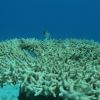 +1 +1
+1 +1Climate change imperils one in four natural heritage sites: report
Climate change imperils one in four natural World Heritage sites, including coral reefs, glaciers, and wetlands -- nearly double the number from just three years ago, a report said Monday. The number of sites at risk has grown to 62 from 35 in 2014, when one in seven were listed, according to the International Union for Conservation of Nature (IUCN), which released the report at UN climate talks in Bonn, Germany.
-
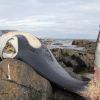 +11 +1
+11 +1Dead Orca Contained Highest Levels of Toxins Ever Recorded in a Whale
An orca that was found dead last year is now considered one of the most polluted whales ever found: The marine animal contained some of the highest levels of polychlorinated biphenyls (PCBs) — human-made organic chemicals known to cause a variety of adverse health effects — ever recorded. Lulu, an adult female killer whale, was a member of the last orca pod living near the United Kingdom. When the dead whale was discovered in January 2016 on the Isle of Tiree, Scotland, after becoming entangled in fishing rope, researchers analyzed...
-
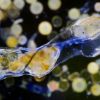 +20 +1
+20 +1Plastics found in stomachs of deepest sea creatures
Animals from the deepest places on Earth have been found with plastic in their stomachs, confirming fears that manmade fibres have contaminated the most remote places on the planet. The study, led by academics at Newcastle University, found animals from trenches across the Pacific Ocean were contaminated with fibres that probably originated from plastic bottles, packaging and synthetic clothes.
-
 +1 +1
+1 +1Mexico creates vast new ocean reserve to protect 'Galapagos of North America'
Mexico’s government has created the largest ocean reserve in North America around a Pacific archipelago regarded as its crown jewel. The measures will help ensure the conservation of marine creatures including whales, giant rays and turtles. The protection zone spans 57,000 sq miles (150,000 sq km) around the Revillagigedo islands, which lie 242 miles (390 km) south-west of the Baja California peninsula.
-
 +22 +1
+22 +1Coral reef bleaching 'the new normal' and a fatal threat to ecosystems
Repeated large-scale coral bleaching events are the new normal thanks to global warming, a team of international scientists has found. In a study published in the journal Science, the researchers revealed a “dramatic shortening” of the time between bleaching events was “threatening the future existence of these iconic ecosystems and the livelihoods of many millions of people”.
-
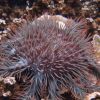 +40 +1
+40 +1Officials killing off coral-eating starfish in Great Barrier Reef
A major outbreak of coral-eating starfish has been found munching Australia's world heritage-listed Great Barrier Reef, scientists said on Friday, prompting the government to begin culling the spiky marine animals. The predatory crown of thorns starfish feeds on corals by spreading its stomach over them and using digestive enzymes to liquefy tissue. This outbreak hits as the reef is still reeling from two consecutive years of major coral bleaching.
Submit a link
Start a discussion




















